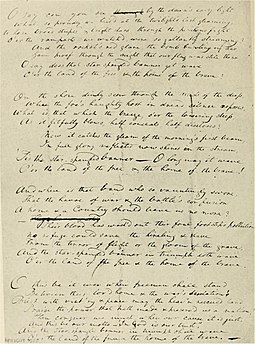"The Star-Spangled Banner" is the national anthe
Post# of 65629

is the national anthem of the United States of America.

An artist's rendering of the battle at Fort McHenry
The lyrics come from "Defence of Fort M'Henry",[2] a poem written on
September 14, 1814 by the 35-year-old lawyer and amateur poet Francis
Scott Key after witnessing the bombardment of Fort McHenry by British
ships of the Royal Navy in Baltimore Harbor during the Battle of Fort
McHenry in the War of 1812. Key was inspired by the large American flag
, the Star-Spangled Banner, flying triumphantly above the fort during the
American victory.

Francis Scott Key's original manuscript copy
of his "Star-Spangled Banner" poem. It is now on display
at the Maryland Historical Society.
"O! say can you see, by the dawn's early light,
What so proudly we hailed at the twilight's last
gleaming,Whose broad stripes and bright stars
through the perilous fight,O'er the ramparts we
watched, were so gallantly streaming?
And the rockets' red glare, the bombs bursting in air,
Gave proof through the night that our flag was still there;
O! say does that star-spangled banner yet wave
O'er the land of the free and the home of the brave?
On the shore dimly seen through the mists of the deep,
Where the foe's haughty host in dread silence reposes,
What is that which the breeze, o'er the towering steep,
As it fitfully blows, half conceals, half discloses?
Now it catches the gleam of the morning's first beam,
In full glory reflected now shines in the stream:
'Tis the star-spangled banner, O! long may it wave
O'er the land of the free and the home of the brave.
And where is that band who so vauntingly swore
That the havoc of war and the battle's confusion,
A home and a country, should leave us no more?
Their blood has washed out their foul footsteps'
pollution.No refuge could save the hireling and slave
From the terror of flight, or the gloom of the grave:
And the star-spangled banner in triumph doth wave,
O'er the land of the free and the home of the brave.
O! thus be it ever, when freemen shall stand
Between their loved homes and the war's desolation.
Blest with vict'ry and peace, may the Heav'n rescued
landPraise the Power that hath made and preserved
us a nation!Then conquer we must, when our cause
it is just, And this be our motto: 'In God is our trust.'
And the star-spangled banner in triumph shall wave
O'er the land of the free and the home of the brave!"[20]
The lyrics come from "Defence of Fort M'Henry",[2]
a poem written on September 14, 1814 by the
35-year-old lawyer and amateur
poet Francis Scott Key after witnessing the bombardment of
Fort McHenry by British ships of the Royal Navy in Baltimore Harbor
during the Battle of Fort McHenry in the War of 1812.
Key was inspired by the large American flag,
the Star-Spangled Banner, flying triumphantly
above the fort during the American victory.

The 15-star, 15-stripe "Star-Spangled Banner" which inspired the poem
The poem was set to the tune of a popular British song written by
John Stafford Smith for the Anacreontic Society, a men's social club
in London. "To Anacreon in Heaven" (or "The Anacreontic Song"
with various lyrics, was already popular in the United States. Set to
Key's poem and renamed "The Star-Spangled Banner", it soon
became a well-known American patriotic song. With a range of one
octave and one fifth (a semitone more than an octave and a half),
it is known for being difficult to sing.
Although the poem has four stanzas, only the first is commonly
sung today.

Sheet music version About this sound Play
"The Star-Spangled Banner" was recognized for official use by the
United States Navy in 1889, and by U.S. President Woodrow Wilson
in 1916, and was made the national anthem by a congressional
resolution on March 3, 1931 (46 Stat. 1508, codified at 36 U.S.C. § 301),
which was signed by President Herbert Hoover.

Commemorative plaque in Washington, D.C. marking the site at 601
Pennsylvania Avenue where "The Star-Spangled Banner"
was first publicly sung
Before 1931, other songs served as the hymns of American officialdom.
"Hail, Columbia" served this purpose at official functions for most of the
19th century. "My Country, 'Tis of Thee", whose melody is identical to
"God Save the Queen", the British national anthem,[3] also served as
a de facto anthem.[4] Following the War of 1812 and subsequent
American wars, other songs emerged to compete for popularity at
public events, among the
 (1)
(1) (0)
(0)